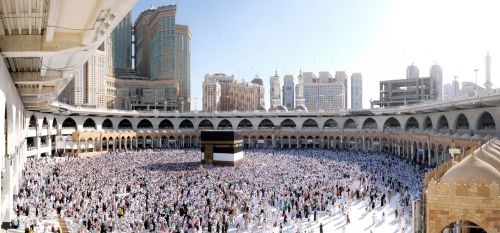 In the Muslim religion, one of the most important things a person can do in his or her lifetime is to participate in the hajj, a massive pilgrimage to Mecca in Saudi Arabia that generally draws millions of people each year. For the past few months, it has been uncertain if the hajj would take place. This year it would fall at the end of July, lasting from July 28th to August 2. Unfortunately, just a few weeks before it would have taken place, the pilgrimage was essentially canceled. The decision to disallow massive numbers of pilgrims to participate in the event is a difficult issue for many Muslims to face.
In the Muslim religion, one of the most important things a person can do in his or her lifetime is to participate in the hajj, a massive pilgrimage to Mecca in Saudi Arabia that generally draws millions of people each year. For the past few months, it has been uncertain if the hajj would take place. This year it would fall at the end of July, lasting from July 28th to August 2. Unfortunately, just a few weeks before it would have taken place, the pilgrimage was essentially canceled. The decision to disallow massive numbers of pilgrims to participate in the event is a difficult issue for many Muslims to face.
Why Is the Hajj So Important?
The hajj is a journey that is mandatory for all Muslims who are able to make it. For many, this means saving up money for many years in order to travel to Mecca. Exceptions to the mandatory nature of the pilgrimage are made if the participant would be unable to leave without causing hardship to his or her family. In situations where a person has too many people depending on him or her to participate in the hajj, another person may be sent instead. The hajj takes place once a year at slightly different times. Other pilgrimages to Mecca, known as the umrah, can be taken at any time. The journey is often described as a life-changing spiritual event by those who participate. Being a pilgrim in the hajj is one of the Five Pillars of Islam. The pillars are fundamental parts of faith that make up the Muslim lifestyle.
Why Were Restrictions Put in Place?
As the dangers of COVID-19 continue to affect people around the globe, large events have repeatedly been canceled. The hajj is a huge gathering, with more than two million Muslims participating every year. With all the people in attendance, it is likely that older people and those in other at-risk groups would come into contact with the virus. While the hajj has technically not been entirely canceled, the event is limited to a fraction of its regular attendance, with only those who are residing in Saudi Arabia being allowed to participate.
How Are Muslims Affected?
Unfortunately, the 2020 hajj being unavailable to many who had made plans to go has caused hardship. Muslims have lost money on reservations, plane tickets, and other expenses. For older Muslims who have waited many years to go, waiting even longer is especially difficult. Some have voiced their despair over the postponement, with some claiming that they had made huge efforts to put aside time and money that are now wasted. While this can be a tragedy, the restrictions are for important reasons. As a huge event that draws people from all around the world, an outbreak of COVID-19 stemming from the hajj could have been disastrous.
Planning for the Future
With the hajj being off the table for many of this year's pilgrims, Muslims are having to adjust plans in hope of a safer time to travel in the near future. For many, this means postponing until a vaccine becomes available. Unfortunately, whether they will need to wait one year or even longer remains very uncertain.
Traveling to Mecca during the hajj is a vital part of the Muslim religion and is something almost every member of the faith is expected to do during his or her lifetime. Like many other big events, the hajj has had to be severely adjusted out of interest for global health. The situation is a difficult one that has been devastating for those who were planning on taking the trip to Mecca this summer. Until the crisis caused by COVID-19 is under control, it will be difficult to say when pilgrims from around the world will once again be able to take the sacred journey.



